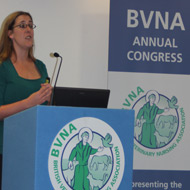Vet nurses "need to take ownership" of antibiotic resistance

Nicola Ackerman
"As vet nurses, we really need to take ownership of the subject of antibiotic resistance," Nicola Ackerman from the Veterinary Hospital, Plymouth, told delegates at the BVNA Congress yesterday.
Antibiotics are essential medicines for treating bacterial infections in both humans and animals, but are losing their effectiveness at an ever-increasing rate.
There are a number of ways to fight antibiotic resistance. One of the most important actions is to prevent infections from happening in the first place. This can be achieved through vaccination (reducing the need for antibiotics), educating clients about the importance of good husbandry, promoting good nutrition (which leads to good health), better food hygiene practices and quarantining new pets before they enter the household to ensure there isn't any cross contamination of fomites.
On Friday, Public Health England released a report on antibiotic use which revealed that between 2010 and 2013, there was a six per cent increase in the number of antibiotics prescribed to humans - despite warnings and campaigns by health experts.
Speaking to a packed lecture room, Nicola Ackerman said: "There is a really well documented link between high prescribing of antibiotics and high resistance levels, so the less prescribing we do, the better."
One way to cut down on the amount of antibiotics prescribed in practice is to reduce the amount of antibiotics used during surgery. There are many times where antibiotics need to be given in surgery - for example when a wound is dirty or contaminated. However, for clean wounds they shouldn't really need to be used. Infection controls in practices should be good enough not to warrant using them.
Veterinary nurses can help tackle resistance to antibiotics by enhancing infection prevention and control. Deep cleaning the entire surgery at least once a week is very important - especially in reception and waiting room areas as these have a very high volume of traffic.
Nurses should also make sure that they are using the appropriate disinfectant and that it is applied for the recommended contact time.
There are also a number of ways veterinary nurses can increase biosecurity, for example by washing their hands regularly, not wearing uniform home and keeping the vet's cars as clean as possible.
Taking place on 18 November, 2014 is European Antibiotic Awareness Day - a Europe-wide annual event that aims to raise awareness about using antibiotics in a responsible way, helping to keep them effective for the future.
To mark the event, the BVA is asking veterinary surgeons and veterinary nurses, farmers and pet owners to pledge to become an 'antibiotic guardian'. For more information about the campaign, and to learn more about antibiotic resistance visit: http://antibioticguardian.com/



 The RCVS has announced a new version of its 1CPD mobile app, with enhanced features for veterinary surgeons and veterinary nurses to record their continuing professional development.
The RCVS has announced a new version of its 1CPD mobile app, with enhanced features for veterinary surgeons and veterinary nurses to record their continuing professional development.